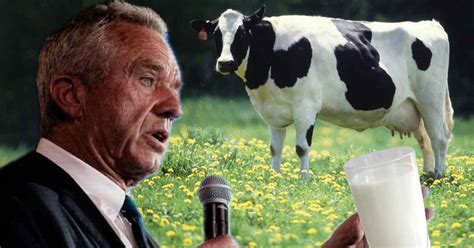
Robert F. Kennedy Jr.’s consumption of raw milk has sparked controversy, raising questions about the potential health risks associated with unpasteurized dairy products, particularly after experiencing parasitic infection symptoms, including brain fog.
Robert F. Kennedy Jr.’s penchant for raw milk has come under scrutiny after he revealed experiencing symptoms consistent with a parasitic infection, potentially linked to his consumption of unpasteurized dairy. Kennedy, known for his skepticism towards conventional medical practices and his advocacy for alternative health approaches, has long been a proponent of raw milk, touting its purported health benefits despite warnings from health organizations like the Centers for Disease Control and Prevention (CDC) and the Food and Drug Administration (FDA) about the dangers of consuming unpasteurized milk.
The revelation about Kennedy’s possible parasitic infection has ignited a debate about the safety of raw milk and the risks associated with consuming unpasteurized products. While proponents argue that raw milk retains beneficial enzymes and probiotics that are lost during pasteurization, health officials emphasize that it can harbor harmful bacteria such as E. coli, Salmonella, Listeria, and Campylobacter, which can cause serious illness, especially in vulnerable populations like pregnant women, children, and the elderly.
According to the original source, RFK Jr. experienced health issues that align with parasitic infection symptoms, including cognitive difficulties described as “brain fog.” While the exact source of the infection hasn’t been definitively pinpointed, his raw milk consumption is under scrutiny, highlighting the inherent risks associated with unpasteurized products.
Kennedy’s advocacy for raw milk is part of a broader platform that challenges conventional medical wisdom and questions the safety and efficacy of vaccines and other established medical interventions. His views have often been met with criticism from medical professionals and public health experts, who argue that his messaging undermines public trust in science and promotes misinformation that could endanger public health. The incident involving the possible parasitic infection has further fueled concerns about the potential consequences of his views and the impact they could have on public perception of health risks.
Raw milk, by definition, is milk that has not been pasteurized, a process that involves heating milk to a specific temperature for a set period to kill harmful bacteria. Pasteurization was developed in the late 19th century as a way to prevent the spread of milk-borne diseases such as tuberculosis, brucellosis, and typhoid fever. The process has been credited with significantly reducing the incidence of these diseases and improving public health.
Despite the widespread acceptance of pasteurization, raw milk advocates argue that it destroys beneficial enzymes and probiotics that are naturally present in milk, making it less nutritious and harder to digest. They also claim that raw milk has a richer flavor and texture than pasteurized milk. Some proponents even suggest that raw milk can help boost the immune system and protect against allergies and asthma.
However, these claims are not supported by scientific evidence. Studies have shown that pasteurization has minimal impact on the nutritional value of milk and that any potential benefits of consuming raw milk are outweighed by the risks of bacterial contamination. Health organizations like the CDC and FDA have consistently warned against the consumption of raw milk and have urged consumers to choose pasteurized dairy products instead.
The debate over raw milk is not just about health risks; it also involves issues of personal freedom and consumer choice. Raw milk advocates argue that individuals have the right to choose what they eat and drink, even if it involves some risk. They also argue that government regulations restricting the sale and distribution of raw milk are an infringement on their personal freedom.
However, public health officials argue that the government has a responsibility to protect the health and safety of its citizens, even if it means restricting certain choices. They argue that the risks associated with raw milk are not limited to those who consume it directly, as contaminated milk can also spread disease to others, especially young children and those with weakened immune systems.
The legal status of raw milk varies from state to state. Some states allow the sale of raw milk in retail stores, while others only allow it to be sold directly from farms. Some states prohibit the sale of raw milk altogether. The federal government does not allow the interstate sale of raw milk, but it leaves it up to the states to regulate its sale within their borders.
In recent years, there has been a growing interest in raw milk, driven in part by the increasing popularity of organic and natural foods. Some consumers are seeking out raw milk as part of a broader effort to eat more unprocessed foods and support local farmers. However, health officials warn that the risks associated with raw milk remain the same, regardless of its source or how it is produced.
The case of Robert F. Kennedy Jr. and his possible parasitic infection serves as a reminder of the potential dangers of consuming raw milk. While Kennedy’s experience may not be representative of everyone who consumes raw milk, it highlights the importance of understanding the risks involved and making informed choices about what we eat and drink. Consumers should carefully consider the potential health consequences before consuming raw milk or any other unpasteurized product.
Furthermore, this incident underscores the responsibility of public figures to be mindful of the potential impact of their statements and actions on public health. While individuals have the right to express their opinions, it is important to ensure that those opinions are based on sound scientific evidence and do not promote misinformation that could endanger public health. RFK Jr.’s case is particularly relevant as his views carry considerable weight among certain groups, potentially influencing health choices and perceptions of risk.
The consumption of raw milk remains a contentious issue, with proponents arguing for its health benefits and opponents highlighting the significant risks of bacterial contamination. The debate is ongoing, and it is likely to continue as long as there are those who believe in the purported benefits of raw milk and those who prioritize public health and safety. In the meantime, consumers should educate themselves about the risks and benefits of raw milk and make informed choices based on their own individual circumstances and risk tolerance.
The incident involving RFK Jr. provides a high-profile example of the potential consequences of consuming raw milk. It serves as a cautionary tale for those who may be tempted to consume unpasteurized products and a reminder of the importance of following the advice of public health officials and medical professionals.
Beyond the immediate concerns about raw milk consumption, the episode also raises broader questions about the role of skepticism and alternative health practices in modern society. While it is important to encourage critical thinking and question conventional wisdom, it is also essential to rely on sound scientific evidence and to be wary of unsubstantiated claims and misinformation. The pursuit of health and wellness should be guided by evidence-based practices and a commitment to protecting public health.
The RFK Jr. situation is a complex issue with several layers. It involves not only health risks associated with raw milk consumption but also questions of personal freedom, government regulation, and the role of public figures in shaping public opinion on health matters. The incident highlights the need for ongoing dialogue and education about the risks and benefits of various health practices and the importance of making informed choices based on reliable information.
The controversy surrounding raw milk and Robert F. Kennedy Jr.’s experience also touches upon the increasing distrust in institutions and expert opinions. This distrust, fueled by various factors including misinformation spread through social media and skepticism towards government agencies, can lead individuals to seek alternative solutions and question established health guidelines. In such a climate, it becomes even more crucial to promote evidence-based information and foster critical thinking skills so that people can differentiate between reliable sources and misinformation.
The ongoing debate about raw milk is a microcosm of larger discussions about food safety, consumer rights, and the role of government in regulating food production and distribution. As consumers become more aware of the potential risks and benefits of different foods, they are increasingly demanding greater transparency and control over their food choices. This trend is likely to continue, and it will be important for policymakers and food producers to respond to these demands in a way that protects public health and promotes consumer choice.
In the context of RFK Jr.’s case, it’s important to remember that correlation doesn’t equal causation. While his symptoms are consistent with a parasitic infection and his raw milk consumption is under scrutiny, it’s crucial to avoid jumping to conclusions without a confirmed diagnosis and a clear link established by medical professionals. Nonetheless, this incident serves as a valuable opportunity to re-examine the potential dangers associated with raw milk and promote informed decision-making.
The overall narrative also highlights the importance of nuanced discussions around health and wellness. While alternative health practices may hold appeal for some, it’s crucial to approach them with caution and consult with qualified medical professionals. Blindly following unproven remedies can be detrimental, especially when they contradict established medical advice. The RFK Jr. situation underscores the need to strike a balance between personal autonomy and responsible decision-making in matters of health.
Moreover, the media coverage surrounding this incident also plays a crucial role in shaping public perception. It’s essential for journalists to report on these issues with accuracy and objectivity, avoiding sensationalism and providing a balanced perspective that includes both the risks and potential benefits of raw milk consumption. Responsible reporting can contribute to a more informed public discourse and help individuals make better decisions about their health.
Finally, this situation brings to light the complex interplay between personal beliefs, political ideologies, and health choices. RFK Jr.’s views on vaccines and other health issues are deeply intertwined with his political activism and his skepticism towards established institutions. Understanding this context is crucial for comprehending the broader implications of his raw milk consumption and its impact on public perception.
The unfolding narrative surrounding RFK Jr.’s health and his raw milk consumption serves as a multifaceted case study with far-reaching implications. It touches upon issues of public health, personal freedom, government regulation, media responsibility, and the intersection of beliefs and health choices. By examining these different aspects of the situation, we can gain a deeper understanding of the complexities involved and promote more informed and responsible decision-making in the realm of health and wellness.
The discussion surrounding raw milk extends beyond individual health choices to encompass broader questions of food systems and agricultural practices. Proponents of raw milk often advocate for sustainable farming methods and local food production, arguing that these practices are more environmentally friendly and support local communities. However, critics point out that raw milk production can also pose environmental risks, such as water contamination from animal waste. A comprehensive understanding of the raw milk debate requires considering these environmental and agricultural aspects as well.
Furthermore, the economic dimensions of raw milk production and distribution are often overlooked. Raw milk producers face unique challenges related to regulation, labeling, and marketing. In some states, they may be required to obtain special permits or licenses, undergo regular inspections, and adhere to strict labeling requirements. These regulations can increase the cost of production and limit the availability of raw milk to consumers. A thorough analysis of the raw milk debate should consider these economic factors and their impact on both producers and consumers.
The cultural and historical context of raw milk consumption also plays a significant role in shaping attitudes and beliefs. In many cultures, raw milk has been consumed for centuries and is considered a traditional food. These cultural traditions can influence individuals’ perceptions of the risks and benefits of raw milk and their willingness to consume it despite the potential health risks. Understanding these cultural and historical factors is essential for appreciating the complexity of the raw milk debate.
The science behind raw milk is also a crucial aspect to consider. While proponents of raw milk often cite anecdotal evidence and personal testimonials to support their claims, it’s important to rely on scientific evidence to assess the potential health benefits and risks. Numerous studies have investigated the effects of pasteurization on the nutritional content of milk and the prevalence of harmful bacteria in raw milk. These studies provide valuable insights into the safety and efficacy of raw milk consumption.
The role of risk perception and risk communication is also relevant to the raw milk debate. Individuals often perceive risks differently based on their personal experiences, beliefs, and values. Effective risk communication involves presenting information about the risks and benefits of raw milk in a clear and unbiased manner, allowing individuals to make informed decisions based on their own risk tolerance. The RFK Jr. situation highlights the importance of accurate and transparent risk communication to help individuals understand the potential consequences of their health choices.
The ethical considerations surrounding raw milk consumption also warrant attention. Some argue that individuals have a moral obligation to protect their own health and the health of others, especially vulnerable populations like children and the elderly. This ethical perspective suggests that consuming raw milk, despite the known risks, may be irresponsible or even unethical. Others argue that individuals have a right to make their own choices about what they eat and drink, even if those choices involve some risk. This ethical perspective emphasizes personal autonomy and the freedom to make informed decisions about one’s own health.
The legal and regulatory framework surrounding raw milk is constantly evolving. As new scientific evidence emerges and public attitudes change, policymakers are continually reassessing the regulations governing the production, distribution, and sale of raw milk. Understanding the legal and regulatory landscape is essential for both raw milk producers and consumers. It’s important to stay informed about the latest regulations and to comply with all applicable laws.
Finally, the role of advocacy groups and organizations in shaping the raw milk debate should not be overlooked. Various organizations advocate for or against the consumption of raw milk, often presenting biased information to support their positions. It’s important to be aware of these biases and to critically evaluate the information presented by advocacy groups. Seeking information from multiple sources and consulting with qualified experts can help individuals form their own informed opinions about raw milk.
The Robert F. Kennedy Jr. situation serves as a powerful reminder of the complexities and controversies surrounding raw milk consumption. By considering the various aspects of the raw milk debate – including health risks, personal freedom, government regulation, media responsibility, and the intersection of beliefs and health choices – we can gain a deeper understanding of the issues involved and promote more informed and responsible decision-making in the realm of health and wellness. The key lies in fostering a culture of critical thinking, evidence-based decision-making, and respect for diverse perspectives, while always prioritizing public health and safety. Frequently Asked Questions (FAQ)
1. What exactly is raw milk, and how does it differ from pasteurized milk?
Raw milk is milk that has not been pasteurized, meaning it hasn’t undergone a heating process designed to kill harmful bacteria. Pasteurization involves heating milk to a specific temperature for a set period, typically 161°F (72°C) for 15 seconds, to eliminate pathogens like E. coli, Salmonella, and Listeria. Pasteurized milk, therefore, has a significantly reduced risk of containing these harmful bacteria compared to raw milk. The FDA considers raw milk a potential health hazard due to this risk. Proponents of raw milk argue that pasteurization destroys beneficial enzymes and nutrients, although scientific evidence largely disputes this claim.
2. What are the potential health risks associated with drinking raw milk?
The primary health risk associated with raw milk consumption is the potential for bacterial contamination. Raw milk can harbor harmful bacteria such as E. coli, Salmonella, Listeria, and Campylobacter, which can cause a range of illnesses, from mild gastrointestinal distress to severe, life-threatening conditions. Symptoms of infection can include diarrhea, vomiting, abdominal cramps, fever, and dehydration. In severe cases, these infections can lead to kidney failure, paralysis, or even death, particularly in vulnerable populations like pregnant women, infants, children, the elderly, and individuals with weakened immune systems. The CDC and FDA strongly advise against consuming raw milk due to these risks.
3. What are the arguments made by proponents of raw milk consumption?
Proponents of raw milk claim it offers several health benefits that are lost during pasteurization. These include the presence of beneficial enzymes that aid digestion, a higher concentration of vitamins and minerals, and the presence of “good” bacteria that support gut health. Some also believe raw milk can help alleviate allergies and asthma. However, these claims are largely unsupported by scientific evidence. Studies have shown that pasteurization has minimal impact on the nutritional value of milk, and the potential benefits of raw milk are outweighed by the risks of bacterial contamination. Proponents also often cite personal freedom and the right to choose what they consume as reasons for supporting raw milk access.
4. What is the legal status of raw milk in the United States?
The legal status of raw milk varies significantly from state to state. Some states allow the retail sale of raw milk, while others permit only on-farm sales. A few states completely prohibit the sale of raw milk for human consumption. Federal law prohibits the interstate sale of raw milk. This patchwork of regulations reflects the ongoing debate about the safety and benefits of raw milk, with different states weighing the risks and benefits differently. Consumers should be aware of the specific laws in their state regarding the sale and consumption of raw milk.
5. How does Robert F. Kennedy Jr.’s case contribute to the raw milk debate?
Robert F. Kennedy Jr.’s experience with a possible parasitic infection, potentially linked to raw milk consumption, has brought renewed attention to the risks associated with unpasteurized dairy products. As a prominent figure known for his skepticism towards conventional medical practices, his case highlights the potential consequences of consuming raw milk, even for those who advocate for alternative health approaches. While the specific cause of his infection is not definitively confirmed, it serves as a cautionary tale and reinforces the warnings issued by public health organizations about the dangers of raw milk. His situation underscores the importance of making informed decisions based on scientific evidence and understanding the potential risks involved in consuming unpasteurized products.









